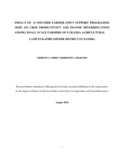Mulungushi University Repository
Impact of e-voucher farmer input support programme (FISP) on crop productivity and income diversification among small scale farmers of Lukanda agricultural camp in Kapiri Mposhi district in Zambia
- MU Home
- →
- Directorate of Research and Post-Graduate Studies
- →
- Disaster Studies
- →
- View Item
JavaScript is disabled for your browser. Some features of this site may not work without it.
| dc.contributor.author | Chibbompa, Chibizwa Chibe | |
| dc.date.accessioned | 2019-04-11T09:43:16Z | |
| dc.date.available | 2019-04-11T09:43:16Z | |
| dc.date.issued | 2018-08 | |
| dc.identifier.uri | https://space.mu.ac.zm/xmlui/handle/123456789/136 | |
| dc.description.abstract | In order to revamp agricultural production in Zambia, Government in 2002 introduced the Farmer Input Support Programme whose aim was to improve small scale farmers’ access to maize based agricultural inputs. However, in 2015/16 season, the Ministry of Agriculture moved away from the conventional FISP and introduced an Electronic Voucher system which broadened the target inputs farmers were allowed to purchase beyond maize inputs only. The overall objective of this study was to assess the impact of the E-Voucher system on crop productivity and income diversification among small scale farmers. The study was conducted in Lukanda Agricultural Camp in Mulungushi farm block of Kapiri Mposhi district which was selected purposively. The study interviewed One Hundred and Fifty Four (154) small scale farmers who were randomly selected using a structured questionnaire out of which 104 were FISP E-voucher beneficiaries and 50 non-beneficiaries. Data was analyzed using the Statistical Package for Social Sciences.The study explored the richness of the livelihood sources that directly contribute to food security and income. Major inputs purchased using the e-voucher cards among sampled farmers in addition to fertilizers were; maize seed (21%), livestock drugs (18%), vegetable inputs (15%), CA implements (7%) and poultry inputs (5%). The trend analysis show that FISP input support has contributed to a 2.8% increase in maize productivity among the beneficiaries in the period 2014/15-2016/17. An increase in income diversification was reported during the E-voucher implementation period among the FISP E-voucher beneficiary farm households. The following recommendations are made; firstly, there is need to consider timely release of inputs under the FISP E-voucher system and secondly, more investment is required in terms of the value of the Evoucher so that farmers are able to source more productive inputs and assets beyond maize inputs. | en_US |
| dc.language.iso | en | en_US |
| dc.publisher | Mulungushi University | en_US |
| dc.subject | Farmer Input Support Programme, E-voucher, Productivity, Diversification, Small Scale farmers | en_US |
| dc.title | Impact of e-voucher farmer input support programme (FISP) on crop productivity and income diversification among small scale farmers of Lukanda agricultural camp in Kapiri Mposhi district in Zambia | en_US |
| dc.type | Thesis | en_US |
